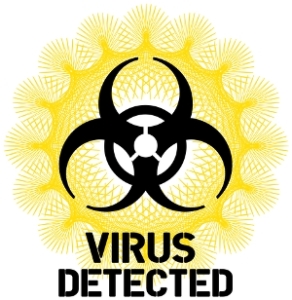| Online: | |
| Visits: | |
| Stories: |

| Story Views | |
| Now: | |
| Last Hour: | |
| Last 24 Hours: | |
| Total: | |
Protect your small business against viruses with these tips
http://robertsiciliano.com/
It is September and it’s National Preparedness Month—a great time to get involved in the safety of your community. Make plans to stay safe, and this includes maintaining ongoing communications. National Preparedness Month culminates September 30th with National PrepareAthon! Day.
 I learned in high school biology class that one of the things that distinguishes life forms from inanimate objects is that living things replicate. Therefore, a computer virus is, well, alive; it replicates itself. It’s alive enough to cause billions of dollars of destruction from the time it attacks a computer network until the disaster is cleaned up.
I learned in high school biology class that one of the things that distinguishes life forms from inanimate objects is that living things replicate. Therefore, a computer virus is, well, alive; it replicates itself. It’s alive enough to cause billions of dollars of destruction from the time it attacks a computer network until the disaster is cleaned up.
But just what is a computer virus?
Not only does this nasty program file duplicate itself, but it can spread to other computers without human involvement.
Unlike a virus with DNA, a tech virus usually doesn’t produce symptoms to give you an early warning. But it’s hell-bent on harming your network for financial gain.
Though a virus is malicious, it may impersonate something harmless, which is why the user lets it in. One type of virus is spyware— which allows your computer to run smoothly as always, while the spyware enables criminals to watch your login activities.
Though viruses often corrupt in secret, others can produce symptoms including:
- Computer programs and smartphone applications open and close spontaneously.
- Computer runs very slowly for no apparent reason.
- Someone you know emails you about the global email you recently sent out promoting a product you have nothing to do with.
You can protect yourself or your business from a virus in the following ways:
- A malment is a common way to let a virus into your computer. This is a malicious attachment that, when clicked, downloads the virus. The email message tricks employees into clicking that attachment. Unless it’s been confirmed by the sender that you’ll be receiving an attachment shortly, never open attachments. Or at a minimum, scan them with antivirus software.
- Never open an attachment sent out of the blue by the IRS, company bank, credit union, medical carrier, etc.
- Apply the above rules to links inside emails. A “phishing” email is designed to look legitimate, like it came from the bank. Click on the link and a virus is released. Or, the link takes you to a site that convinces you to update some login credentials—letting the hacker know your personal information.
- Never use public Wi-Fi unless you have a VPN (virtual private network) encryption software.
- All devices should have continually updated security software including a firewall.
- Browser and operating system as well should be updated with the latest versions.
- Prevent unauthorized installations by setting up administrative rights.
- Employees, from the ground to the top, should be aggressively trained in these measures as well as bring-your-own-device protocols.
- Back up your data. Why? Because when all else fails and your data and devices have been destroyed by malware, a cloud backup allows you to not only recover all your data, but it helps you sleep at night.
The prevention tactics above apply to businesses and really, everyone. Employees should be rigorously trained in how malware works and other tricks that cyber thieves use. To learn more about preparing your small business against viruses, download Carbonite’s e-book, “5 Things Small Businesses Need to Know about Disaster Recovery.”
#1 Best Selling Author Robert Siciliano CSP, CEO of IDTheftSecurity.com is a United States Coast Guard Auxiliary Flotilla Staff Officer of the U.S. Department of Homeland Security whose motto is Semper Paratus (Always Ready). He is a four time Boston Marathoner, Private Investigator and is fiercely committed to informing, educating, and empowering people so they can be protected from violence and crime in the physical and virtual worlds. As a Certified Speaking Professional his “tell it like it is” style is sought after by major media outlets, executives in the C-Suite of leading corporations, meeting planners, and community leaders. Disclosures.
Robert Siciliano personal security and identity theft expert and speaker is the author of 99 Things You Wish You Knew Before Your Identity Was Stolen.
Source: http://robertsiciliano.com/blog/2015/09/09/protect-your-small-business-against-viruses-with-these-tips/



